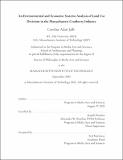An Environmental and Economic Systems Analysis of Land Use Decisions in the Massachusetts Cranberry Industry
Author(s)
Jaffe, Caroline Adair
DownloadThesis PDF (25.25Mb)
Advisor
Paradiso, Joseph
Terms of use
Metadata
Show full item recordAbstract
This dissertation presents an analysis of the environmental and economic impacts of land use decisions in the Massachusetts (MA) cranberry industry. Cranberry farming is culturally and economically important in Southeastern MA but faces ongoing, compounding challenges that make it increasingly difficult for farms to stay profitable: heightened competition from Midwestern farms using modern farming techniques, fluctuating cranberry prices, an aging farmer population, and climate change.
These factors have led many farmers to consider new options for their farmland including undergoing farm renovations, selling their land to developers, or partnering with conservation organizations to restore their farmland to its native wetland state. Given the scale of the cranberry industry and the amount of ecologically valuable yet vulnerable land at stake, farmers, local governments, and environmental advocacy groups alike need higher quality information and tools to inform land use decisions.
Building on the science of cranberry bog restoration and incorporating perspectives from across the cranberry industry, this thesis applies ecosystem service modeling to geospatial data to quantify environmental outcomes in this decision space and make an economic argument for restoration. In the first section of the thesis, I conduct stakeholder interviews and a literature review to identify socioeconomic contextual issues and industry stakeholder objectives. Next, guided by the Environment-Vulnerability-Decision-Technology framework, I use open-source ecosystem service models applied to public satellite imagery to model and analyze the environmental and economic impacts of different land use scenarios and identify priority restoration areas. Finally, I present and evaluate the results of this modeling work in a web-based decision-support tool that allows stakeholders to interact with and explore different land use outcomes.
Integrating tools from diverse disciplines, this research presents novel, spatially-explicit analysis on the impacts of land use decisions in the MA cranberry region and identifies areas where restoration could generate environmental and economic synergies. With this work, I aim to deliver practical data tools that will incentivize sustainable decision-making, address knowledge gaps in the MA cranberry industry, and contribute to broader discussions around natural climate solutions and agricultural land retirement, two topics of urgent and relevant interest in the fight against climate change.
Date issued
2022-09Department
Program in Media Arts and Sciences (Massachusetts Institute of Technology)Publisher
Massachusetts Institute of Technology